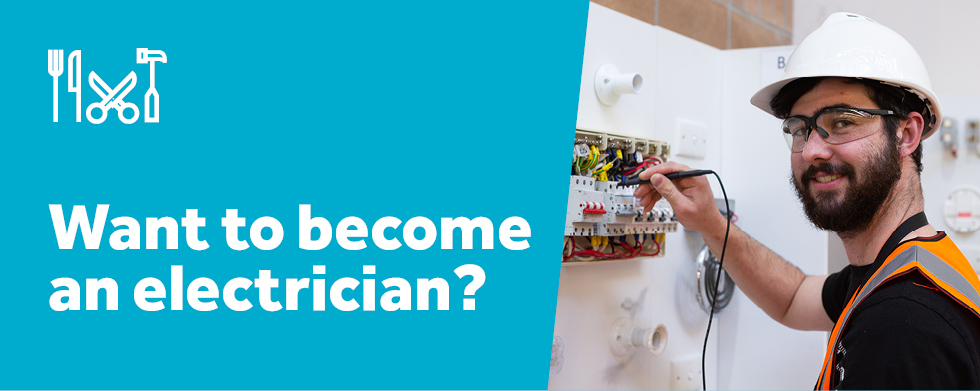Electrical Apprenticeship

A guide to electrical apprenticeships
- Learn the benefits of an electrical trade qualification
- Get advice on how to find an employer
- Prepare for your apprenticeship
What does an electrician do?
Electricity is an essential part of our modern lives. It allows us to access lighting, heating and cooling, communications, the internet, and so many more of our everyday conveniences and luxuries.
Electricians may work as part of a large team on construction sites, manufacturing or servicing new or existing houses, or repairing and maintaining electrical equipment in an industrial setting. In the domestic environment, electricians may carry out repairs and installation of lighting or power outlets, appliances, heating and cooling equipment, telecommunications or audio visual fitouts, or work as part of a team on large-scale projects.
Why should I be an electrician?
As a qualified licensed electrician your training helps ensure that people are protected from harm when using electricity. This is an important role in a regulated industry that is different to many other trades. A trade qualification as an electrician offers the opportunity to work across a range of areas and in a variety of locations. This can include working for yourself, as part of a small team or on a large scale project. It's a job that does and will continue to need well trained specialists in the field to carry out licensed work, and demand continues to grow both in Australia and around the world.
Where can an electrical apprenticeship take me?
An electrical apprenticeship can be a springboard to a wide range of career pathways. It could kick-start your career as a:
- licensed tradesperson (self-employment, be your own boss)
- maintenance electrician
- general construction electrician
- industrial electrician
- domestic electrician.
With specialisations in:
- building management systems
- mechanical control systems
- telecommunications
- fire and security systems
- solar and renewables
- audio visual.
Future career opportunities can extend to:
- electrical engineering
- project and construction management
- business management
- technical design in manufacturing
- education and training.
What makes a good electrician?
Personal attributes that make a good electrician include:
- good communication skills and a positive attitude
- good problem solving skills
- a preference for working with your hands
- the ability to work to a high standard and take pride in your work
- the ability to work well on your own and in a team environment
- an understanding of the need for safe work practices
- a sound understanding of mathematics and the ability to do calculations.
How do I find an employer?
- Contact an Australian Apprenticeship Network Provider (ANP)
- Look for job vacancies online via Seek or in local newspapers including the Canberra Chronicle
- Advertise your intention for an apprenticeship at local electrical supply Stores or drop off your resume at various electrical companies
- Ask around, chat to someone in the industry, or call around to electrical businesses to enquire.
How do I make a good impression?
Offer a resume with your personal information, education, employment history and personal attributes. Be confident and well-presented, make good eye contact and have a positive can-do attitude. Research the industry, the employer’s company, the position requirements, and sell your strengths and positive attributes accordingly.
How does an apprenticeship work?
CIT and an Australian Apprenticeship Network Provider (ANP) can assist you in your endeavour to become a qualified electrician.
An apprenticeship is a training agreement between the employer and apprentice and is usually for a four year period. The training agreement includes practical on-the-job experience where the apprentice is provided opportunities in the workplace to work with a tradesperson to develop skills relevant to the industry. The apprentice's employment is supported by structured off-the-job training with a registered training organisation (RTO) like CIT, where the apprentice studies and develops the skills identified in the national electrical training package. The apprentice will need to keep a record of all their on-the-job tasks (profiling) and the skills they are developing, and have their supervisor sign them off for the RTO to utilise in their training.
Find out more about apprenticeships.

